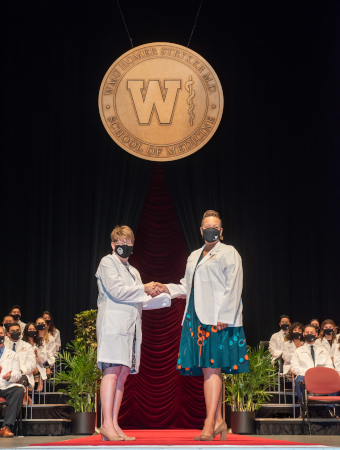
When she walked off the stage last September at WMU’s Miller Auditorium, Tierra Jolly basked in the moment as she donned her first white coat as a first-year student at WMed. And then she paused to add a little flair, pinning a small rocket to the coat’s lapel.
For Jolly, the white coat served as a welcome reminder that she was right where she was meant to be, pursuing her dream of becoming a physician. And with the pin, Jolly was honoring her infant daughter, Rocket, who died in 2017, keeping her close to her heart, and never forgetting the trials and triumphs of the journey that brought Jolly and her family to Kalamazoo.
“There’s just something about the white coat that makes you feel like you belong the moment you get it,” said Jolly, 40, who is a native of Washington, D.C.
For Jolly, the MD Class of 2025 White Coat Ceremony on September 11, 2021, was a significant moment in the early stage of her first year at WMed. Just a day prior to the event, she and her classmates had taken their first-ever summative exam for the Molecular Foundations of Health and Disease course and Jolly didn’t pass the test.
She was devastated.
“I didn’t want to go to the white coat ceremony,” Jolly recalled. “I felt like I was going to show up and everyone would know, and I questioned whether I belonged here. It wasn’t until I walked onto the stage at Miller and Dean (Paula) Termuhlen put the white coat on me that I thought, ‘ I do belong here.’
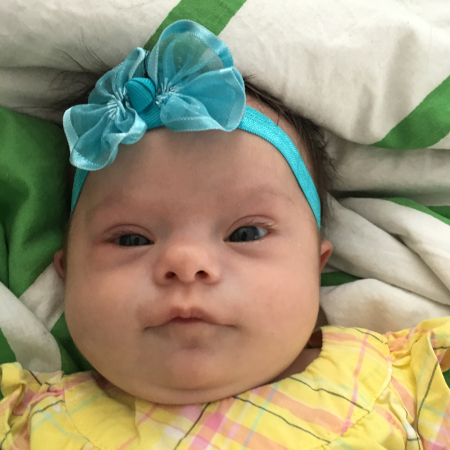
“When you fail an exam in medical school, your self-confidence is blown to bits,” Jolly added. “I felt so good in my white coat that day that I wore it to my remediation the next week and I passed the test. For my first two summatives I wore my white coat because I needed that reminder that I belonged here.”
Along with her white coat, Jolly said the ceremony last September helped remind her of the support that exists for WMed students from faculty and staff, as well as donors to the medical school’s White Coat Sponsorship Program. Inside her white coat the day she received it was a note from her white coat sponsors, Steve and Amy McKiddy, welcoming her to Kalamazoo and the medical profession.
Since that time, Jolly and her husband, Rusty, and their three children – ages 5, 3, and 2 – have formed a formidable bond with the McKiddys and have found an outlet and support system as both families have children with disabilities.
“I came to medical school and I’m older and married and a parent, and I have all of these kids and they’re disabled, and I talk about disability a lot,” Jolly said. “Those are marks of difference that can make it harder for other people to feel like they can connect with you. So, with the McKiddys, they invite my whole family over to their home, they see that my son has Down syndrome, and they think he’s adorable. They enlist their sons, one of whom has autism, to keep an eye on our children so we can actually have adult conversation. And then I learn that the reason Steve is involved as a white coat sponsor is that he was born with cerebral palsy.
“It really was an opportunity where I felt like I was finally being seen instead of just feeling like the old lady in class.”
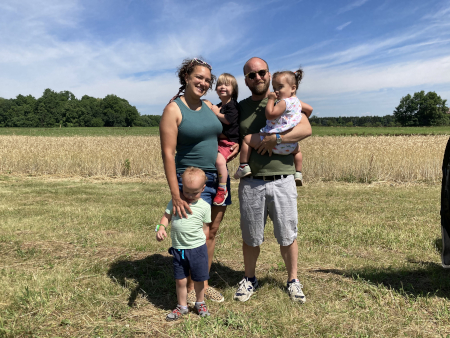
In taking a non-traditional path to medical school – she was 39 when she arrived for her first day at WMed in July 2021 – Jolly’s decision to pursue a MD degree was shaped by years of experience as an educator and mother. The path started when she began working for Teach for America in New Orleans in 2007 after schools there reopened in the aftermath of Hurricane Katrina.
She met her husband there – though they wouldn’t start dating until 2016 – and taught in the city’s ninth ward. Resources, including access to quality health care, were scarce, a reality that came full circle for Jolly when she had a young student who came to school one day and then never returned because she had died from cancer that had gone undiagnosed. In a separate instance, she said a student died at home in their sleep from a traumatic brain injury suffered in a fight at school.
Several years later, after she returned to her hometown of Washington, D.C., to teach, Jolly said she had another student – a 15-year-old – who was pregnant and died, though doctors were able to save the young girl’s baby.
“I came to realize that it didn’t matter how good of a teacher I was if my students couldn’t come to school because they were dying,” she said. “Right around that same time, I started dating my husband and I made a joke about my next life and that I was going to be an OB and he said, ‘All you have to do is go to school.’”
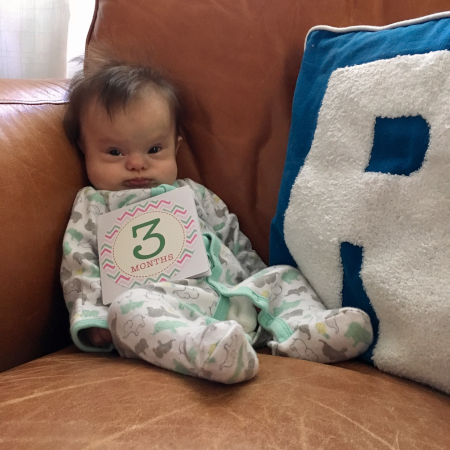
So, with a bachelor’s degree in theatre and master’s degree in U.S. and Public History already in hand, in 2016, Jolly began her pre-requisite courses at a community college in Maryland to set the stage for applying to medical school. She decided to start with calculus, agreeing with her husband that her success or non-success in the class would help them decide whether her pursuit of medical school should continue.
As she and her husband set their plan in motion, Jolly learned she was pregnant with Rocket and she spent her second and third trimesters teaching during the day and taking calculus classes at night. The couple also learned prior to their first daughter’s birth that Rocket had Down syndrome and would need open heart surgery after birth to repair an atrioventricular septal defect.
Rocket was born via emergency C-section in April 2017, just two weeks before Jolly was scheduled to take her final exam for her calculus class. In the midst of it all, she took – and aced – the exam.
After her daughter was born, Jolly resigned from teaching and planned to focus on caring for Rocket and continuing her pre-requisite work for medical school. The surgery to repair Rocket’s heart took place in August 2017. Almost four months old at the time, Rocket died following the surgery on August 18, 2017, from what Jolly said was a ventilator accident.
Rocket’s death came just 10 days before Jolly was set to begin her next set of pre-requisite courses. While devastating, Jolly said her daughter’s passing also reinforced her decision to pursue her dream of being a doctor.
“I knew what I wanted to do so that maybe I wouldn’t make that kind of mistake for other parents in the future,” Jolly said. “When you go through something like that, you want to help other people. You have this awful thing that happens and you can’t change it so you figure you might as well put it to good use.”
So, Jolly poured herself into her coursework and in 2018, she and her husband decided to adopt a young boy from Ukraine with Down syndrome named Sasha. While going through the process to bring Sasha to the U.S., Jolly said she and Rusty learned they were pregnant with their son Malcolm.
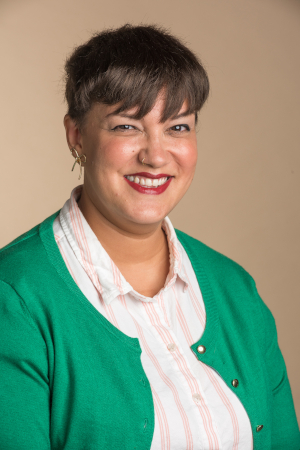
By October 2018, Jolly and her husband welcomed Sasha and, just a few months later, in January 2019, Malcolm was born. Shortly after Malcolm’s birth, Jolly said she noticed a small lump on the back of his neck that was the size of a chickpea. By the time doctors conducted a MRI to examine the small mass and got results two weeks later, Jolly said it had grown to the size of a golf ball.
Malcolm was later diagnosed with cancer, news that prompted Jolly to delay taking the MCAT by three months in 2019. When she applied to medical schools during her first cycle of applications later that year, the effort proved unsuccessful.
Meanwhile, at three months old, Malcolm began a 43-week course of chemotherapy, ringing the bell to mark the end of his treatments shortly after his first birthday.
“That kid is tough,” Jolly said of Malcolm. “He wants to be a nurse when he grows up.”
In August 2020, Jolly and her husband welcomed a daughter – Clementine – and it was during her maternity leave that Jolly worked on her second round of applications for medical school, which included her application to WMed.
By February 2021, Jolly said she and her husband had begun to discuss their options and next steps if she didn’t get into medical school. They each picked three cities, locations that would put them near other possible future options for medical school for Jolly, as well as quality healthcare for their children.
And then, just like that, Jolly got the call from Kalamazoo and Jean Shelton, the medical school’s former assistant dean for Admissions and Student Life, was on the other end of the line.
Jolly learned she had been accepted to WMed.
“I didn’t say anything,” Jolly recalled. “She was like, ‘Hello, are you there?’ I said, ‘I’m speechless. Thank you.’ I sat in my car and cried for 30 minutes.”
In the midst of her shock and excitement, Jolly said the reality of moving her family from Washington, D.C., to Kalamazoo in the middle of the COVID-19 pandemic also set in. They were about to move everything and leave the life they knew behind for a new adventure in Kalamazoo.
“That was really scary,” she said.
Now, all these months later, Jolly is now in her second year at WMed. The rigors of medical school haven’t been easy but Jolly said she has been buoyed by the support of the McKiddys – her children are learning to read from books given to the family by the McKiddys – and a close-knit group of classmates who have become her close friends.
“Part of the reason I chose to come to WMed was because of its stated commitment to diversity and everything I read showed there wasn’t a culture of competition,” Jolly said. “My classmates have been there to help tutor me or accompany me to anatomy lab for review. They are the reason why I’m still here from an academic standpoint. They keep showing up for me and it’s really amazing. I feel really grateful.”
Jolly has also become involved in the community and serves on the board of the Down Syndrome Association of West Michigan. She and her husband have become best friends with their next-door neighbors. Her children each have a stethoscope and they practice checking heart and lung sounds on one another.
“We’re in a good place right now,” she said.
As she moves forward, Jolly has her eyes on a future in medicine that will allow her to work with pediatric patients and potentially pursue anesthesiology as her specialty.
Her white coat will accompany her as her journey continues. So will the rocket pin on the coat’s lapel.
“The white coat, actually, is very uncomfortable but every time I put it on I know what it means,” Jolly said. “It has your name embroidered into it, it’s yours. It’s always that reminder that you belong here.”
